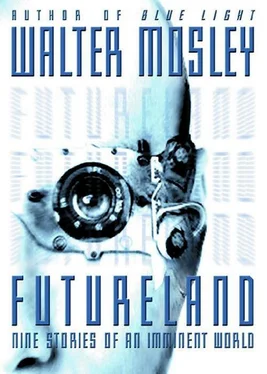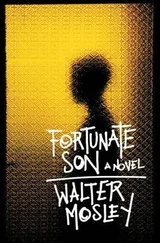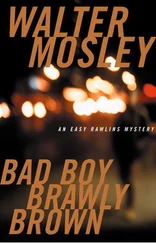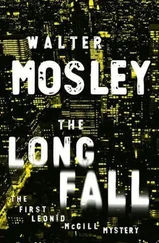“I’m a midleveler, M,” Neil said then. “I don’t have the creds for outer-circle work.”
“Don’t worry,” the golden woman replied. “You’ll be fine.”
Blue Nile led the confused prod toward the outer circle, to a table that had no other workers.
“You can sit backward you know,” the little man told Neil. “What?”
“Control double-space switches the screen. We read your med-docs. They diagnosed claustrophobia. Open sky’s the best cure for that.”
“They won’t mind?”
“Who?”
“The controllers.”
“You mean Atty and Or? No. They don’t care as long as the job gets done.”
“But...” Neil stopped talking because he felt light-headed again.
Blue Nile dragged the clear plastic chair under the table, set it upright to face the window, and slapped the slender backrest, to indicate that Neil should take a seat. Then he hit a few keys and the virtual monitor appeared backward, just as the little man had said it would. The nervous young prod sat and looked down on the semiopaque images that appeared inside the clear plastic of the table before him.
“This is an important project, Neilio,” Blue Nile said. “It’s called the Third Eye. It’s a device that will record and enhance all sensory data that the wearer experiences: sight, sound, temperature, even atmosphere content and ultraviolets and sounds beyond human range. It’s a perfect passive device for police evidence or espionage and a good active device for soldiers in the field.”
On the screen was a simple line figure of a man with a huge eye embedded in his forehead.
“I can’t do this level. I mean, I do robotic fingers and surface undulations. This work is beyond anything I was ever taught. I’ve never even heard of ultraviolet preceptor chips.”
“That’s because none exist.”
“Then how do you expect me to—”
“Dr. Kismet said in his intro to The Digital Production Line that micro-logic design can address any mechanical question a human being can ask.”
“But you have to know how to use it.”
“There’s seven workstations at this table — all for you.”
“How long do I have to finish?”
“Work at it for a few weeks and then report to Oura on how you’re coming.”
“A few weeks? What about the M after me?”
“There is no one after you. The Third Eye will be your design.”
Blue Nile left Neil at his workstation considering the sky. The only clouds he had ever seen before had been cut off by buildings at the end of the long blocks of Upper Manhattan. Even at the East River the skyline of Brooklyn blocked the light from street level. On the other side of Old Manhattan the Hudson River had long ago been built over to allow New York to obtain seven of its twelve fiefs from New Jersey.
Neil had never seen clouds like these, larger than any building, larger than Old Manhattan itself. He tried to work but he was distracted. He’d never been in an office like this one. Maybe it was a test, a test they gave after a prod was found unconscious in the hall in front of his new assignment. He might not even be in office GEE-PRO-9. He could be in the subbasement psychological evaluation area. This window could be a screen pretending to be the sky outside.
I wonder if it’s real, though, Neil thought. If it’s film and not computer-generated.
He couldn’t leave the office to check where they were, that was New York law. Prod rooms were designed with portable toilets against the wall and food machines near the door. Lunch breaks were to be taken at your workstation, this was so for all buildings of over one hundred eighty floors.
Due to the high density of population, hall traffic must be controlled in case of emergency evacuation, the ordinance read. The only way to leave the building, outside of the prod’s prescribed exit time, was by obtaining an escalator pass. But past the fiftieth floor the escalators took too long: by the time you got halfway to the street it would be time to return to your station.
So Neil had to pretend that this impossible work situation was real. He applied himself to the project he’d been given, trying to remember all the look-up protocols they’d taught him in high school, but his eyes kept raising from the table to look out on the sky. There was a strange yellowish gray mist on the horizon underneath an extremely dark cloud.
“That’s a rain cloud,” a feminine voice said.
She was a dark-colored young woman with features so strong and set that her face seemed almost artificial.
“What?” Neil asked nervously.
“That mist.” She had a southern accent. “It’s rain. Pretty soon it’s gonna hit the windah.”
“We can’t talk.”
“Uh-huh, we can. They let us take breaks whenever we need to.”
“Breaks? Whenever you want?”
“Whenever you need ’em,” the girl said.
Neil thought her face was ugly, but there was something very sensual about the way her mouth made words.
“That’s crazy.”
“Why?”
“Because... because nobody would ever work if they could just stop whenever they wanted.”
“Not when you want it,” she said, “when you need it.”
“What’s the difference?” Neil asked.
“Don’t you ever get tired sometimes when you workin’?” The woman sat on top of the workstation next to Neil’s. He looked around to see how Athria or Oura would react, but they didn’t seem to notice where their prods were or what they were doing.
“Don’t you?” she asked again.
“Um, well, sometimes.”
“Like you lookin’ at the screen and it seem like it don’t make no sense whatever.”
“Yeah,” Neil said, giving in to the conversation. “Most of the time.”
“It wouldn’t be so bad if you could get up and stretch your legs. It wouldn’t be too much if you could go talk for a few minutes.”
“But that’s a D-mark,” Neil said. “Seventeen’a them and you’re in Common Ground.”
“But they don’t give no D-marks here,” she said. “They just say get back to work, but in a nice way.”
“What’s your name?”
“Nina.”
“Nina what?”
“Bossett. I’m from down Mississippi.”
“I’m Neil Hawthorne. I was born here in Manhattan.”
“Look,” Nina said, pointing at the window. “Here it comes.”
Neil turned and was greeted by heavy sheets of rain. A bright branch of lightning flashed over Brooklyn and a distant rumble of thunder boomed in through the glass.
“It’s beautiful,” Nina said, touching the big knuckle of Neil’s right hand.
For his part Neil was fighting dizziness again. He’d never seen rain from a high window, nor had he been touched by a woman with real passion in her voice. He’d visited the Eros-Haus almost every month to be with the impatient sex-worker girls, he’d seen meteorological reports depicting rainstorms on the 3D vid, but he’d never looked out on the world from such a vantage point, he’d never had a woman touch him in a gesture of friendship.
“I gotta get back to work,” Neil said, worrying that the ugly girl with the sensuous mouth would look through the clear tabletop and see the erection pushing its way down his thigh.
“Okay,” Nina said. She hopped off the desk. “But could we eat lunch together later?”
Neil didn’t want to have anything to do with her. “Okay,” he said in spite of his thoughts.
For the next few hours Neil Hawthorne tried to come up with a plan to create the Third Eye sensory recording device. He had never designed a product before. No GT office he’d ever worked in actually designed a device. All they did was apply circuits to systems that needed them added in the most economical and functional ways. Inserting a timepiece in a suitcase handle or embedding a vid-sys in a bathroom tile — that was the kind of work mid-techs did. All of the technology already existed, had been used and proven, but the Third Eye was new ground. It wasn’t an insertion but an original design.
Читать дальше












